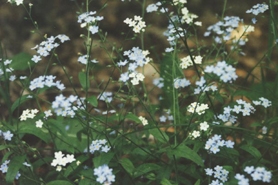Woodland forget-me-not
(Myosotis sylvaticum or M. sylvatica)
Woodland forget-me-not is a short-lived creeping woodland perennial plant. Five-petaled flowers are small, blue with a bright yellow center.
Other names for this plant include:
- Common names: forget-me-not, victoria blue
- Scientific names: Myosotis oblongata
Classification in Wisconsin: Restricted
- Ecological Threat
-
- Woodland forget-me-not can quickly crowd out native plant species and form large monocultures.
- It affects community composition by reducing the number of native herbs, such as spring ephemeral wildflowers.
- This species can escape gardens and grow in undisturbed natural environments.
- Woodland forget-me-not is challenging to control due to its mechanisms for spreading. It can reproduce abundantly by spreading stolons (runners) and producing great seeds.
- Identification
-
Leaves & stems: Simple and alternate, oblong to spatulate in shape. Plants are perennial, sprawling via rhizomes and reach up to 12 inches tall.
Flowers: Sky-blue in color, rarely white, with a yellow center. Individual flowers are 5-petaled. Blooms May-September.
Similar species: A similar invasive species is the aquatic forget-me-not (Myosotis scorpiodes; non-native); however, the woodland forget-me-not can be distinguished by its spreading, hooked sepal hairs. There is a native forget-me-not that is somewhat rare in Wisconsin. Small forget-me-not (Myosotis laxa) can be characterized from the non-native M. scorpioid by corolla limbs (free part of petal), which are 2 to 5 mm wide in M. laxa and 5 to 10 mm wide in M. scorpioid. These species can also be distinguished by their calyx lobes, which are about as long as the floral tube in M. laxa and much shorter than the rest of the flowery box in M. scorpoides.
- Control
- Mechanical:
- Smaller populations can be hand-pulled or dug before the seed set. Be sure to remove the entire root system.
- Monitor for re-sprouts.
- There is little information on the effectiveness of chemical treatment on Myosotis species.
- Foliar spray with glyphosate accordingly to label rates.
- Resources
- Sources for content:
- Czarapata, Elizabeth; Invasive Plants of the Upper Midwest: an illustrated guide to their identification and control. The University of Wisconsin Press. 2005. Pg. 120-121.



